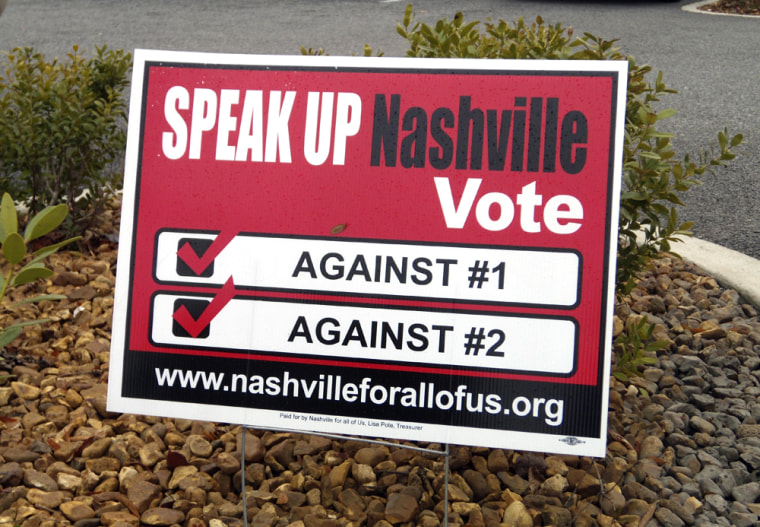Voters in Nashville, Tenn., on Thursday rejected a measure that would have prohibited city government from using any language but English.
With 100 percent of precincts reporting, the measure was defeated on a vote of 41,752 to 32,144.
The vote means the city of nearly 600,000 people refused to become the largest in the U.S. to prohibit translating written and spoken communications for residents who speak no or little English.
The proposal sparked intense debate. Proponents said using one language would have united the city, but business leaders, academics and the city's mayor worried it would have given the city a bad reputation. Similar measures have passed elsewhere.
Lost in translation?
Exactly how much translation would have been silenced if the measure had passed was murky. While it would have required that all government communication and publications be printed in English, it would have allowed an exception for public health and safety.
For example, officials with the health department have said the public health exemption might have had to allow health workers to use translation to tell an immigrant with tuberculosis or a sexually transmitted disease how to avoid contaminating others. But workers with the department, one of the largest users of translation services, likely would have had to use English with someone who violated animal control or codes ordinances.
The referendum’s leader, city Councilman Eric Crafton, promoted it as a way to unite Nashville and prevent the kind of extensive translation services — and the associated expenses — provided by cities like New York or Los Angeles. He has pushed for English only since 2006 and got the issue before voters through a petition drive.
“It is just an important part of keeping government small by having one language,” supporter Glenda Paul, 35, said as she exited a Donelson voting precinct Thursday. “If I moved to France to start a business, I would be expected to speak French and that doesn’t mean that I am not welcome there. It just means I need to respect the language.”
Business leaders, academics, religious leaders, Nashville Mayor Karl Dean and Gov. Phil Bredesen argued the measure would tarnish the city’s welcoming image, harm tourism and business recruitment and endanger federal funding for many city services.
Claire King, 31, who lives in East Nashville, said Thursday that she voted against the amendment because “it sends a message of intolerance.” She said she thought multiple perspectives and languages enrich to the city’s culture.
Other cities with official language
Nashville’s documented translation expenses have totaled $522,287 since 2004. By comparison, the special election cost $300,000.
Thirty states, including Tennessee, and at least a dozen cities have declared English their official language, said K.C. McAlpin, executive director of Arlington, Va.-based ProEnglish, which donated money to support the referendum.
About 10 percent of Nashville’s nearly 600,000 people speak a language other than English in their homes, according to census data. The city is 5 percent Hispanic and home to the nation’s largest Kurdish community and refugees from Southeast Asia, the Middle East and Africa.
